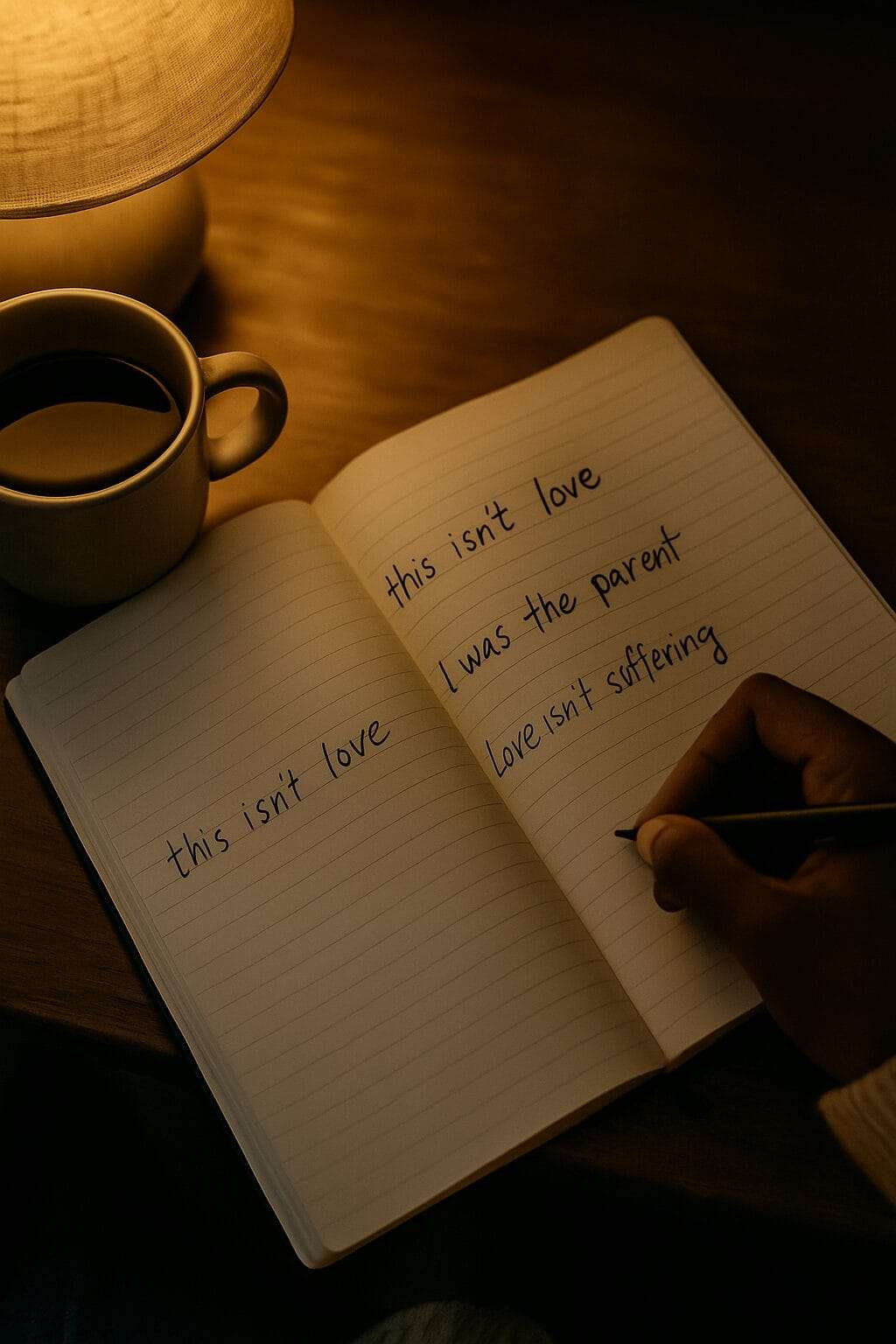- Updated: June 11, 2025
This isn’t about Tom or Mary—it started long before them.
Your team is bracing for the recap. Another blown-up weekend. Another situationship gone sideways. You walk in Monday morning with a fresh espresso and a story that starts with “You won’t believe what happened…”
But deep down? You do believe it.
Because it keeps happening.
You’re the one with the five-figure retainer, a solid team, and airtight NDAs—not for your clients, but for your love life. You’ve outgrown the chaos in business, but not in romance. And for the first time, you’re wondering if this mess isn’t random. If maybe… you’re the common denominator.
If that realization just hit you like a wave—good. Stay with it.
Because this isn’t about blame. It’s about origin.
In this post, we’re unpacking how childhood trauma—especially emotional incest, neglect, or early enmeshment—shapes the way you love, lead, and self-destruct in intimacy. Not to shame you. But to wake you up.
You’re not broken.
But you are patterned.
And you can’t change what you don’t name.
If You’re Brave Enough to Keep Reading…
🔍 Why Smart People Repeat the Same Relationship Wounds
You know how to close deals. You run teams. You’ve read the books, done the therapy, maybe even led a workshop on boundaries. But when it comes to love? You keep attracting chaos—or becoming it.
Why?
Because intelligence doesn’t rewrite emotional wiring.
Especially the kind that formed before you even knew what love was supposed to feel like.
We don’t fall for people by logic.
We fall by familiarity.
And that familiarity is often formed in dysfunction.
Let's talk about emotional incest.
— Denise Lee (@DeniseGLee) August 10, 2023
This is when a parent turns to their child for the emotional intimacy a romantic partner should provide, it becomes emotional incest.
Picture this scenario:
Dad is frequently away from home due to his busy job. Mom is very lonely.
Mom tells…
👪 Emotional Incest: When Parenting Gets Inverted
As children, we learn how to relate to others by watching and internalizing the emotional choreography of our parents. Ideally, a healthy parent protects their child’s innocence—offering guidance, not emotional dependence.
But an emotionally immature or attention-starved parent?
They lean on their child for comfort, validation, or even pseudo-romantic connection.
This dynamic is called emotional incest—and it’s more common than most people realize.

Kenny’s Story
Meet Kenny.
He’s eight years old. The oldest of three.
Dad’s always gone for work. Mom is lonely.
So Mom tells Kenny, “You’re the man of the house now.”
And just like that, Kenny’s childhood is over.
He starts checking in on his younger siblings.
But more than that—he starts emotionally caretaking for his mother.
She confides in him about her stress, her job, even her body insecurities.
And Kenny? He’s proud. He feels needed.
But also confused… and overwhelmed.
Because Kenny doesn’t have the tools to fix her.
And he shouldn’t have to.
This is emotional incest in action.
And it quietly teaches Kenny that love means responsibility.
That safety means sacrifice.
That relationships are earned through self-abandonment.
So what happens when Kenny grows up?
He might be drawn to emotionally volatile partners. Narcissistic ones. People who need rescuing.
Not because he enjoys the chaos—but because it feels familiar.
It mirrors the one relationship that first defined love for him:
The one where he had to overfunction just to be “enough.”
👑 Forever Daddy’s Little Princess
Now flip the script.
You’re not Kenny.
You’re his future partner—but you’ve got your own version of emotional patterning.

Maybe you were the girl who fantasized about a prince.
A daddy’s girl who idealized her father, put him on a pedestal, and made excuses for his distance, his emotional unavailability, or even his cruelty.
You internalized the idea that love meant earning approval.
That silence was strength.
That one day a perfect man would show up and finally choose you, without making you beg for crumbs.
You don’t see how deeply your fantasy was shaped by what your father couldn’t give you—and what you refused to acknowledge he never had to begin with.
And so now? You punish the real men in your life for not living up to a role that was always a projection.
You demand loyalty but flinch at intimacy.
You crave connection but brace for abandonment.
It’s not about being weak.
It’s about being wired.
When your emotional foundation was built on performance, secrecy, or caretaking…
you will unconsciously recreate it until it becomes unbearable—or conscious.
And here’s the brutal truth:
Until you examine those early roles, you’ll keep mistaking dysfunction for destiny.
🚨 Reality Check: You Might Be the Pattern If…
Forget my opinion. You don’t know me.
But you do know your own patterns.
This isn’t about judgment—it’s about clarity.
If you’ve been wondering whether this is just a one-time thing… or something deeper, this list will tell you.
✅ Got a stacked résumé but a wrecked love life—and you still tell yourself it’s just “bad luck.”
✅ Say you’re too busy for love—but you obsess over people who breadcrumb you emotionally.
✅ Cycled through “fixer” partners, “wounded bird” types, or emotionally constipated achievers who remind you of your parents.
✅ Remember that your therapist has gently suggested childhood trauma… and you switched topics.
✅ Have drafted texts with more legal caution than your client contracts.
✅ Defend your partner’s poor treatment—even to yourself—because “they’re just under stress.”
✅ Have been told you’re emotionally unavailable… by three different exes… and you laughed.
✅ Feel safer in roles of control, distance, or over-functioning than in mutual emotional vulnerability.
✅ Give incredible relationship advice—but can’t follow any of it when your heart’s involved.
✅ Have burned money on retreats, programs, or astrology charts to figure out what’s “wrong with them”… but you haven’t looked at your own story since childhood.
✅ Tell people you’re fine. Meanwhile, your friends and family exchange worried glances behind your back.
If more than 3 of these hit?
You’re not cursed. You’re conditioned.
And it’s time to unlearn what survival once taught you.
🧠 Monkey See, Monkey Date
You’re not broken. You’re mirroring.
And it didn’t start in your last relationship.
It started when your nervous system learned—before you had words—what love, conflict, and closeness were supposed to feel like.
We’re all born with powerful nerve cells called mirror neurons, located in the premotor cortex. Their job? Teach us how to function in the world—how to walk, talk, gesture, emote, respond.

But here’s the kicker:
Mirror neurons don’t filter for “healthy” versus “harmful.”
They don’t ask, “Is this functional?”
They just ask, “Is this familiar?”
So if the relationships around you growing up were built on volatility, withdrawal, perfectionism, control, or manipulation—your brain said, “Ah. Got it. This is love.”
And it locked it in.
You learned that love meant:
Performing to earn approval
Being needed instead of being known
Staying quiet to keep the peace
Fixing others so you wouldn’t be abandoned
Withholding affection to gain power
Apologizing even when you didn’t do anything wrong
You’ve been mirroring your early caregivers—emotionally, behaviorally, even chemically—for decades.
And you’ll keep repeating those scripts until something breaks the pattern.
Until you break it.
🔧 Rewiring Starts With Awareness (and Brutal Honesty)
You can’t un-know this now.
You’ve seen the pattern.
You’ve felt the ache behind the armor.
And whatever you used to call just your type now looks suspiciously like your childhood in disguise.
This is where the real work begins—not in blaming your parents or shaming your past, but in interrupting the inheritance.
You don’t heal by thinking harder.
You heal by choosing differently—in small, consistent, spiritually honest ways.
Here’s what rewiring your love patterns actually looks like:

🛠️ 1. Cognitive Behavioral Truth-Telling
You’ve spent years telling yourself things like “I’m just picky,” or “I don’t need anyone,” or “They just couldn’t handle me.”
CBT helps expose those lies for what they are: emotional armor.
You learn to question the automatic thoughts that keep you stuck—and replace them with something truer, not just prettier.
💬 Old script: “If I have needs, I’ll get abandoned.”
💬 New script: “My needs don’t make me weak. They make me real.”
🔄 2. Name the Pattern—Out Loud
Silence is where trauma festers.
Say it: “I parented my parents.”
Say it: “I thought love meant control.”
Say it: “I’ve been dating to reenact, not relate.”
Your nervous system can’t heal from something it’s still pretending doesn’t exist.
🤝 3. Create Safety Without Performing
You don’t have to be charming, sexy, funny, brilliant, or useful to be worthy of love.
Start practicing relational safety where nothing has to be earned:
Group therapy or 12-step spaces
Honest friendships where truth > polish
Relationships where you can say “I don’t know” or “That hurt” without punishment
If you’ve never felt safe without performing, this part will feel like death.
That’s how you’ll know it’s working.
🧘🏾 4. Build Micro-Moments of Nervous System Repair
Rewiring isn’t loud.
It’s not sexy.
It’s breathing through the urge to text.
It’s pausing before fixing someone else’s crisis.
It’s walking away from someone who feels familiar but dangerous.
This is the sacred, unseen work.
The kind that actually sticks.
💬 Final Thoughts: Old Childhood Memories Doesn’t Have Hurt Your Present Love Life
If this cracked something open in you, good.
That ache you feel? That’s your inner alarm clock going off.
It’s not too late.
You’re not too far gone.
And no, you don’t have to wait for your parents—or your ex, or your future partner—to do anything differently.
You’re the pattern breaker.
You’re the one who sees it now.
And that makes you powerful in ways you haven’t even begun to grasp.
This work won’t always be pretty.
Sometimes it’ll feel like spiritual detox.
But what you’re building? It’s cleaner. Safer. Real.
You can lead a business and still need re-parenting.
You can dominate the boardroom and still collapse in your bedroom.
You can be wildly functional and still deeply wounded.
Both can be true.
And healing begins when you stop pretending otherwise.
If this landed and you’re sitting with more questions than answers…
I’d love to hear from you.
👉 Send me a message
Whether you’re just now connecting the dots—or you’ve been carrying this truth alone for years—you’re not too late. And you don’t have to untangle it alone.
🎙️ Want more honest conversations like this one?
Listen to the podcast for real talk on healing, leadership, and learning how to love without losing yourself.
👉 The Introverted Entrepreneur – stream here
💛 Ready to go deeper and break your pattern—for real?
Let’s explore what healing leadership looks like from the inside out.
👉 Work with me


